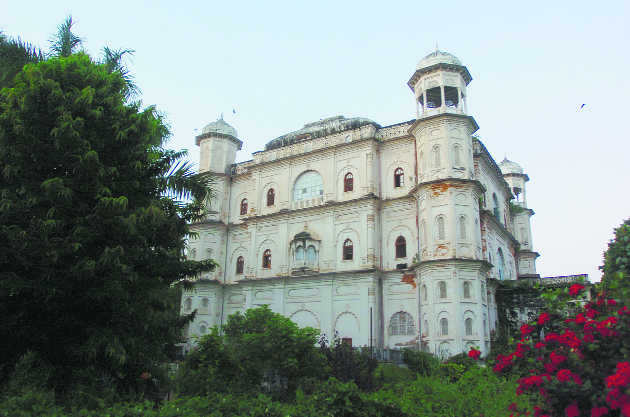
Enemy’s Palace? The Butler Palace in Lucknow once housed the library of the Indian Council of Philosophical Research. Photo: Ajay Kumar Singh
Mukesh Ranjan in New Delhi
Is the government of India about to hit the jackpot? Consider this: the Ministry of Home Affairs (MHA) recently gave the go-ahead to the government-appointed custodians to dispose of 'enemy properties.' And guess the worth of these 9,400 properties spread across the country: well over Rs 1,00,000 crore, more than enough to cover one-fifth of the total fiscal deficit (around Rs 5,00,0000 crore estimated in the 2018-19 Budget). The amount would be sufficient to meet the total budgeted expenditure on health, education and social protection for 2018-19, estimated at Rs1.38 lakh crore.
Since the sale proceeds of ‘enemy properties’ is not going to come in one financial year, the projected amount may also be enough to take care of the need of a new scheme: “Revitalising Infrastructure and Systems in Education (RISE) by 2022” announced in the 2018-19 Budget.
Like all the jackpots, there are a few ifs. First the facts: Over the past one decade, it took a Supreme Court judgment, six ordinances and a law passed by Parliament for the government to take the ownership of “enemy properties.”
But what are these assets? These are the properties left behind by people who took citizenship of Pakistan and China. The Centre's move came after the amendment in the 49-year-old Enemy Property (Amendment and Validation) Act which ensured that the heirs of those who migrated to Pakistan and China during Partition and afterwards will have no claim over the properties left behind in India. At a recent meeting, Union Home Minister Rajnath Singh directed that those properties which are free from encumbrance should be disposed of quickly for monetization.
Not so easy…
Experts think that the finality to the issue would remain a “mirage.” The reason is the law enacted by Parliament makes the custodian the owner of enemy property retrospectively from 1968. Thus it voids the "legal sales undertaken by enemies of enemy properties since 1968 to natural citizens of India". This means a person who may have bought an enemy property in good faith, when such sale and purchase were legal, now stands to lose the property. This contravenes the rights given to citizens of the country, they said.
Senior Congress leader and former Rajya Sabha member Rashid Alvi has personally dealt with the issue during the previous UPA tenure and also with the present government. “The decision of the present dispensation will result into gross injustice to those who preferred to stay back in India and chose the country over Pakistan,” he said. Alvi said a similar law was also proposed during the UPA regime. "I along with several MPs then had approached the Congress top leadership and also then Prime Minister Manmohan Singh and impressed upon them that such a law would be gross injustice to our own citizens. Thus the proposal was shelved."
"The present law does not protect and give justice. It seems the anti-minority mindset of ruling BJP is at work. I am sure once the process of selling properties is set in motion the Supreme Court would take cognizance of injustice," Alvi said.
The NDA government on March 26 kicked off the monetization process of more than 9,400 identified enemy properties by issuing guidelines. The office of the custodian is directed to submit a list of all such movable and immovable assets within three months.
What govt ‘expects’
The government has also formed a valuation committee at the district-level, headed by the district magistrate, and an inter-ministerial disposal committee, headed by an additional secretary. According to the database of such identified properties, a senior MHA official said, there are 9,280 units left behind by the people who took citizenship of Pakistan and 126 who left in favour of China. The government has vested these properties in the Custodian of Enemy Property for India, an office instituted under the central government, he said.
Law and reality
When nations go to war, they often seize the properties in their countries of the citizens and corporations of the enemy country. This happened during the First and the Second World Wars when the US and the UK seized properties of German corporations and citizens.
Initially, the Indian government acquired such properties under the Defence of India Acts, which were temporary laws and ceased to operate after the wars ended. Therefore, to administer the enemy property seized during the wars, the government enacted the Enemy Property Act in 1968. This law laid down the powers of the custodian of enemy property for management and preservation of the enemy properties.
Pakistan had also enacted similar laws to take over properties and assets of Indian citizens and companies in Pakistan during the wars. But unlike India, it sold off these properties in 1971.
SC rulings, ordinances
The Supreme Court settled some of these questions in 2005. It ruled that the custodian of the enemy property was administering the property as a trustee, and the enemy continued to be its owner. Therefore, on the death of the enemy, the enemy property should be inherited by their legal heirs. In 2010, the government issued an ordinance to expand the powers of the custodian. It sought to permanently vest enemy property in the custodian even in case of the enemy's death or a change in his nationality. But the ordinance was allowed to lapse.
The issue of enemy property attracted legislative interest again in 2016 when five more ordinances were issued. These ordinances went a step further and vested ownership rights over enemy property in the custodian. This effectively negated the Supreme Court decision of 2005, and made the central government the owner of enemy property.
Properties
Pakistanis 9,280 units
Chinese 126 units
State-wise (properties left behind by Pakistanis)
Uttar Pradesh 4,991
West Bengal 2,735
Delhi 487
Goa 263
Those Left behind by Chinese
Meghalaya 57
West Bengal 29



























